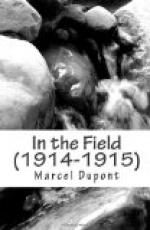In front of the Hotel des Lacs a certain number of the men had already lined up, in front of their horses. Huddled in their cloaks, with collars turned up, they were stamping their feet and blowing into their hands. It must have been real torture for them too to come out of their straw litter, where they were sleeping so snugly a few moments before, rolled up in their blankets. They had got a liking for the kind of comfort peculiar to the campaigner, and had invented a thousand and one ingenious methods of improving the arrangements of their novel garrison. Sleeping parties had been gradually organised, and sets of seven or eight at a time enjoyed delightful nights, stretched on their clean straw. Many of them would certainly not be able to get to sleep if they suddenly found themselves in a real bed. And then it is less difficult to get up when one has gone to bed with one’s clothes on, and when the room is not very warm. Not one of them complained; not one of them grumbled. We can always count on our brave fellows.
“All present, mon Lieutenant!”
It was the senior non-commissioned officers of the two squadrons assembled there who reported. Every one had got up and equipped himself at the appointed hour; not one was missing at roll-call; they had all assembled of their own accord; the corporals had not needed to knock at door after door to wake the sleepers. Our Chasseurs had very quickly established simple customs and rules of their own which ensured the regularity of the service without written orders. This intelligent and spontaneous discipline is one of the most admirable features of this campaign. It has grown up by degrees, without any special orders or prescriptions from above, with the result that the hardest labours are carried out almost without supervision, because each man understands the end in view and the grim necessities which it involves.
They understood at once that this early hour was the only one at which the relief could be effected. And every other day, just as on that December morning, twenty-five men out of each squadron get up at half-past one, equip themselves, and saddle their horses, whilst the cooks warm up a good cup of coffee for each man. Then, without any hurry, but at the exact moment, they form up in fighting order at the appointed spot, and when the officer arrives, in the dark, rain, wind, snow, or frost, he is sure of receiving the same report:
“All present, mon Lieutenant!”
Quick! Mount. We shall feel the cold less trotting over the hardened roads this bright night and under this brilliant moon. Two and two, in silence, we issued from the village in the direction of R. I knew that I should find a little further on, at the cross-roads where the crucifix stands, the fifty men of the first half-regiment and Second-Lieutenant de G., who serves under me.




